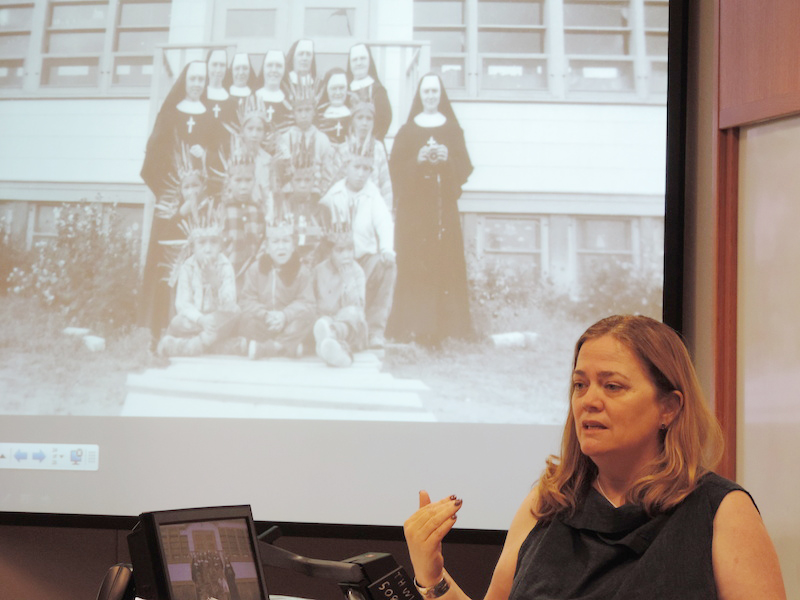
UM Law professor Karen Busby discusses Residential Schools at recent national law meetings held on campus
Scholars discuss prostitution and other human rights issues
Canadian feminists are torn over how and even if the government should rewrite prostitution law, experts on women in prison said June 7 at a national law and society conference at Robson Hall.
Some argue that sections of the law recently struck down because they make sex work more dangerous should not be replaced at all, while others feel johns and pimps should be charged.
Australian Debbie Kilroy, a former inmate turned lawyer, wants johns to know that sex workers can call police. She understands the philosophy behind decriminalization of prostitution, which has been tried in parts of Australia, but said “it isn’t working for the women who I walk with.”
Someone raped as a child who then learned to trade sex for drugs is not necessarily making adult choices when she turns 18, Kilroy said. “They’ve actually been pipelined into prostitution.”
Canadian prisoners’ rights advocate Kim Pate told conference participants she believes prostitution is part of the continuum of violence against women. It used to be legal for a man to own a woman and children, to beat them and to rape his wife. “I see this as the next stage, saying it’s not OK to buy and sell women.”
Just because some sex workers argue for decriminalization does not mean that’s the last word on the topic, Pate said. An inmate reminded her “it’s just as disrespectful to parrot what I say as to disregard what I say, if you don’t engage with me and… have a dialogue.”
University of Manitoba professors presented some of the arguments for decriminalization earlier this year at a seminar organized by the Centre for Human Rights Research.
Kilroy said it’s important that Canadian feminists not shy away from tough debates like this. “The women’s movement in this country has been divided by men – as an outsider, I can see that.” The lawyers who took the Bedford prostitution case to the Supreme Court of Canada didn’t argue on behalf of the men who want to sell and buy women’s bodies, she said.
“They actually took three women (sex workers) so they could split women in half in this country.”
What feminist scholars on both sides of the debate have in common is opposition to the new law recently introduced by the Harper government, which also targets sex workers by banning them from advertising.
Pate asked feminist lawyers to come together to defend the young women she expects will be the first charged.
About 110 people attended the Canadian Law and Society Association’s annual meeting, which was held at the University of Manitoba this year to celebrate the law school’s 100th anniversary.
Many of the talks related to human rights, including:
- Canadian Museum for Human Rights curator Armando Perla showed how Canada’s Indigenous legal traditions will be as prominent in the museum as the French civil law and English common law traditions. “This is something we haven’t done enough in Canada, I feel.”
- Dr. Greg Bak, Prof. Karen Busby and Ry Moran, the new director of the National Research Centre for Truth and Reconciliation hosted by the University of Manitoba, explained the challenges of developing sensitive protocols that both respect privacy and allow access to records about residential schools to help keep the memory of human rights violations at the schools alive.
- Elders Sherry Copenace and Darlene Courchene, along with Indigenous lawyer Aimée Craft, who joins Robson Hall as an assistant professor in July, talked about how they are pulling together stories that help explain and rebuild Anishinaabe laws about water. “Our research is really our stories,” Copenace said. “I’m doing this for my children and grandchildren. I’d like to leave a legacy for them.”
Research at the University of Manitoba is partially supported by funding from the Government of Canada Research Support Fund.






